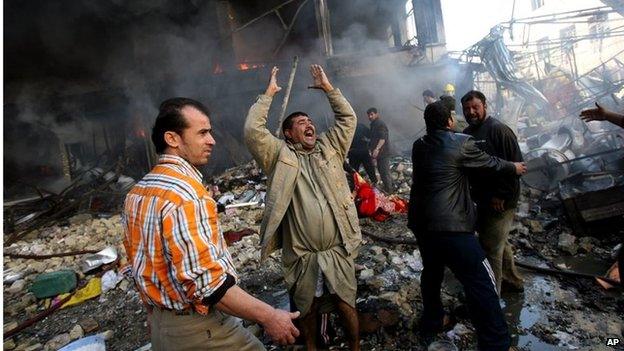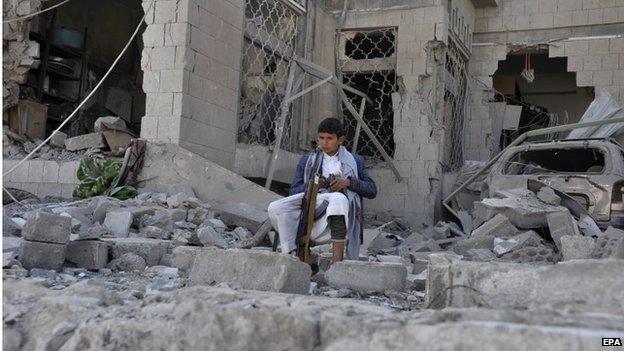Jihadist violence: The devastating cost
- Published

Less than four years ago, jihadist violence was widely believed to be in a state of terminal decline.
Osama Bin Laden and his most senior lieutenants had been killed, and the peaceful uprisings of the Arab Spring seemed to be ushering in a new era of freedom and democracy in which al-Qaeda and its jihadist terrorism looked outdated - if not anachronistic.
Journalists, academics, and even senior policymakers were ready to move on. Talk about the "strategic defeat", "decline", and "fall" of al-Qaeda was common.
By the end of 2014, it is no longer al-Qaeda or jihadism that look outdated but the predictions of their imminent demise.
Far from nearing defeat, jihadist groups everywhere have regrouped and taken advantage of new conflicts and instability - often in the very countries that saw popular uprisings during 2011.
The most spectacular newcomer is Islamic State, a group that has declared the creation of a caliphate, holds territory from the Syrian city of Aleppo to the outskirts of the Iraqi capital, Baghdad, and has rivalled - if not replaced - al-Qaeda as the leader of global jihadism.
Over the past three months, I helped the BBC produce a global snapshot of this phenomenon. Our aim was to record all the reported deaths that were caused by jihadist violence during the month of November.
This task was made possible by combining the vast intellectual, journalistic and professional resources of the BBC World Service, BBC Monitoring, and the International Centre for the Study of Radicalisation (ICSR), external at King's College London.
Human toll
The findings are both important and disturbing.
In the course of November, jihadists carried out 664 attacks, killing 5,042 people - many more than, for instance, the number of people who lost their lives in the 9/11 attacks.

Al-Qaeda is still active but becoming eclipsed by other jihadist groups
While comparisons to earlier periods are difficult, the overall picture is that of an increasingly ambitious, complex, sophisticated and far-reaching movement:
Though Islamic State is the deadliest group, and the conflict in Syria and Iraq the "battle zone" with the largest number of recorded fatalities, jihadist groups carried out attacks in 12 other countries. In just one month, they were responsible for almost 800 deaths each in Nigeria and Afghanistan, as well as hundreds in Yemen, Somalia, and Pakistan.
Excluding incidents of jihadist infighting, 51% of fatalities were civilian. If government officials, policemen and other such non-combatants are included, the figure rises to 57%. The vast majority of victims were Muslim.
While jihadist violence used to be associated with mass-casualty bombings - such as the ones in New York, Madrid and London - today's jihadists employ a much greater variety of tactics, ranging from classical terrorism to more-or-less conventional operations. In our data, bombings were outnumbered by shootings, ambushes, and shelling, reflecting the increased emphasis on holding territory and confronting conventional forces.
More than 60% of the deaths were caused by jihadist groups that have no formal relationship with al-Qaeda. Though al-Qaeda and its affiliates - especially al-Nusra Front in Syria and al-Qaeda in the Arabian Peninsula (AQAP) - still play an important role, our data show that treating "jihadism" and al-Qaeda as one and the same is less true than ever.
The project tells the story of a movement in the middle of a profound transformation - one whose final outcome is impossible to predict.
Our immediate focus, however, was the terrible human cost: with, on average, more than 20 attacks and nearly 170 deaths per day, jihadist groups destroy countless lives - most of them Muslim - in the name of an ideology that the vast majority of Muslims reject.
If anything, this highlights the movement's scale and ambition, but also the long-term political, social, ideological, and military commitment that will be needed to counter it.
Peter R Neumann is Professor of Security Studies at King's College London and directs the International Centre for the Study of Radicalisation and Political Violence (ICSR). He served as the BBC's principal academic adviser for the Jihad: Counting the Cost project.